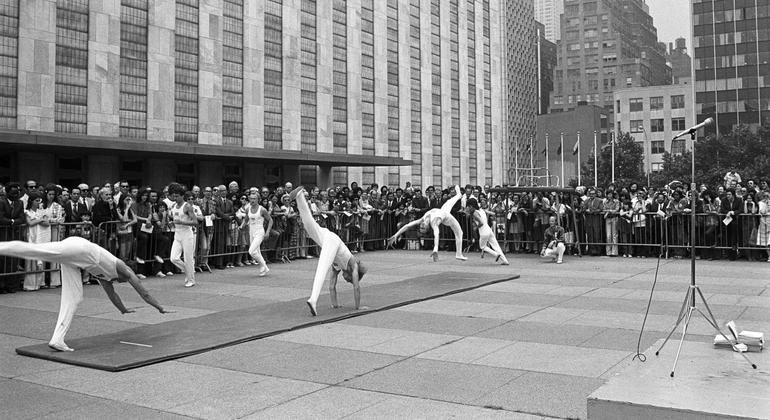The United Nations harnesses the power of sport to bring people together, support development efforts, and promote peace and unity on a global scale. By participating in events at all levels, from grassroots to international, and launching campaigns and initiatives, the UN utilizes the universal appeal of sport to drive positive change.
In the summer of 1973, a team of Sweden’s top gymnasts concluded a tour of the United States with an outdoor performance at the UN Headquarters in New York. The 18-member team showcased their skills in front of the General Assembly building, aiming to promote interest in health and physical fitness. Sweden’s involvement in UN peacekeeping operations around the world, including the UN Emergency Force II in the Middle East, highlighted the country’s commitment to global peace and security.
The performance by the Swedish team in 1973 was a testament to the potential of sport to inspire and unite people from diverse backgrounds. As a form of universal language, sport transcends boundaries and fosters camaraderie among individuals and communities. The video of the team’s routine captured the essence of their athleticism and dedication to promoting positive values through sport.
Recognizing the immense impact of sport on development and peace, the UN designated 6 April as the International Day of Sport for Development and Peace in 2013. This annual observance underscores the role of sport in advancing the UN’s objectives for sustainable development and fostering a culture of peace. World leaders reaffirmed the importance of sport as an enabler of sustainable development when they adopted the 2030 Agenda for Sustainable Development in 2015.
Since then, the UN has collaborated with athletes and sports associations worldwide to promote the Sustainable Development Goals (SDGs) through initiatives like Football for the Goals. In 2016, refugees made history by participating in the Olympics for the first time, showcasing the resilience and determination of displaced individuals. The Refugee Olympic Team, supported by the UN refugee agency (UNHCR) and the International Olympic Committee (IOC), served as a symbol of hope for millions of refugees worldwide.
During the Paris Olympics, the largest ever Refugee Olympic Team competed in 12 sports, offering a beacon of hope to forcibly displaced people around the world. Athletes like boxer Cindy Ngamba, who became the first refugee Olympic medalist, exemplify the spirit of perseverance and triumph over adversity. Their achievements on the global stage inspire others to overcome obstacles and pursue their dreams, regardless of their circumstances.
The collaboration between the IOC and the UN has been instrumental in promoting the use of sport as a tool for achieving development goals and fostering peace. Through joint initiatives and partnerships, these organizations have championed the transformative power of sport to bring people together, promote inclusivity, and build a more peaceful world.
In 1992, the IOC revived an ancient tradition by…









